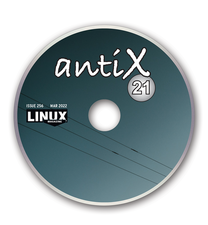On the DVD
On the DVD

antiX 21 and Haiku R1/Beta 3
antiX 21 (64-bit)
Based on Debian stable, antiX 21 is designed to be light and efficient. The full installation version available on this month's DVD is 1.45GB and requires 256MB RAM. However, for older computers, antiX also has a 800MB base version, a 440MB core version, and a 180MB net version. The core and the net versions only install from the command line and without encryption. Both are recommended for those who want total control over the installation, which is necessary for a secure system. From within antiX, users can also set up a live flash drive from which to boot a computer. In addition, antiX is one of the rapidly diminishing number of distributions that still includes a 32-bit version.
One of antiX's standout features is its installer, which gives concise, clear help at each step of the process. The installer is notable for its unobtrusive security features, including a choice between a legacy kernel, which is more secure, and a modern kernel which might have more bugs, as well as a small graph that indicates password strength. Once installed, antiX offers a desktop with a system summary widget and a menu with prominently displayed administrative tools that include numerous command-line tools.
Don't let antiX's drab default wallpaper deceive you: It can be easily changed. Users of any level can appreciate antiX's speed and minimalism, as well as its emphasis on hands-on computing.
[...]
Buy this article as PDF
(incl. VAT)